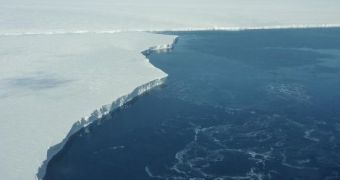A joint investigation carried out by UC Irvine scientists and other researchers has revealed that ice loss in the Antarctic is mainly due to the fact that warm oceanic waters cause the continent’s ice shelves to dissolve from underneath.
For many years, it was believed that Antarctica's ice loss was triggered by ice calving, i.e. the breaking off of a chunk of ice at a glacier's edge.
Writing in an article published in the June 14 issue of the journal Science, the researchers detail how, according to their investigations, 55% of the shelf loss recorded in Antarctica between 2003-2008 was triggered by basal melt.
“We find that iceberg calving is not the dominant process of ice removal. In fact, ice shelves mostly melt from the bottom before they even form icebergs,” study lead author Eric Rignot sums up his and his fellow researchers’ findings.
Despite the fact that they are all melting because of warm oceanic waters flowing beneath them, ice shelves in the Antarctica respond somewhat differently to these influences.
Thus, giant ice shelves such as Ross, Filchner and Ronne have been documented to melt at a slower pace than relatively small ice shelves.
Although ice flow from the continent replenished these ice shelves to a certain extent, the researchers say that the ice is simply melting too fast and that, all things considered, the entire continent is undergoing major changes.
The scientists intend to use this information to better predict how this continent will respond to the changes brought about by climate change and global warming.
More precisely, they wish to establish how ice shelves in this part of the world will be affected by the estimated increase in global oceanic temperatures, and how this will in turn influence sea level rise.
“This has profound implications for our understanding of interactions between Antarctica and climate change. It basically puts the Southern Ocean up front as the most significant control on the evolution of the polar ice sheet,” researcher Eric Rignot explains.

 14 DAY TRIAL //
14 DAY TRIAL //